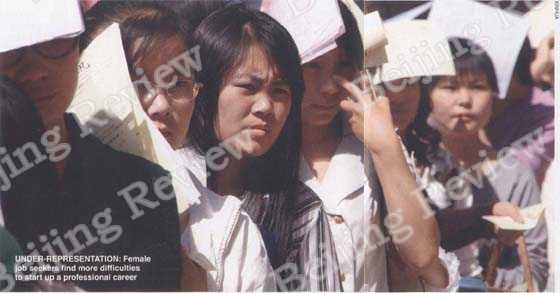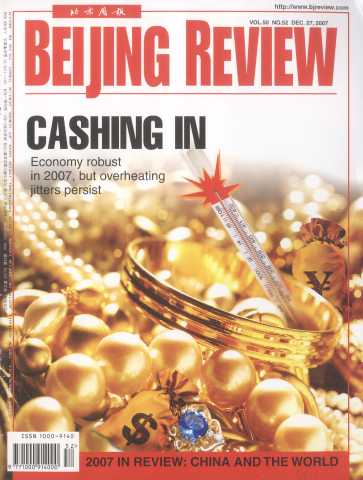Women's average pre-tax income was 65 percent of men's in Shanghai in 2005, down from 73 percent reported in 2000
"Women can hold up half the sky!" With this statement, the late Chinese leader Mao Zedong put an end to an era when women were considered inferior to men. The constitution of China stipulates, "Women in the People's Republic of China enjoy equal rights with men in all spheres of life; in political, economic, cultural, social and family life." Empowered by equal education and employment opportunities, women have gained higher status in and out of their homes and have achieved great successes in arts, education, technology, business and politics.
Despite remarkable improvements in women's overall social status, a gender gap still exists. Now, women find it difficult to get a job, to retain their job, to advance in their career and to balance personal life with career. Gender discrimination in employment is prohibited by the Employment Promotion Law, which will come into force on January 1, 2008. The new law also forbids employers from including clauses in the employment contract to restrict women's freedom to get married or give birth to a child.
Tilted scale
Social transformation often shapes women's lives. Since China implemented its reform and opening-up policy in 1978, significant social and economic changes have taken place. China's economy has been growing rapidly and the country has lifted hundreds of millions of people in rural areas from absolute poverty.
"Despite such progress, China faces great challenges. Disparities between those who benefit from economic advancement and those who are left behind are sharpening," said the United Nations Development Program (UNDP). The World Bank estimates China's income disparity as measured by the Gini Coefficient has gone up by 50 percent in the past two decades.
In the meanwhile, the gender income gap has also widened. "Social and economic transition in China means that opportunities for women and men are changing rapidly. There are significant differences in the ways in which men and women benefit from growth," said Adrian Davis, the UK's Department of International Development (DFID) Representative in China, in a 2005 speech at the launch of China Gender Facilities, an initiative to reduce gender inequality through research and advocacy.
Profound changes have occurred in the labor market. The "iron rice bowl" has been broken. Mass layoffs during the restructuring of state-owned enterprises and the migration of rural surplus labor to the cities have intensified competition. To add worse to worst, job growth lags behind labor force growth. Until the early 1990s, the government assigned jobs to new graduates. State-owned enterprises and government organizations had to take the persons assigned to them. Now, women have to compete with men for jobs.
Moreover, firms are unabashed in profit seeking. In their recruitment advertisements, some firms do not even bother to disguise their preference for male candidates. Phrases such as "female preferred" and "male only" are frequently listed in job requirements. A survey administered by the Women's Federation of Shanghai revealed that a little over half of the female respondents replied that they had experienced gender discrimination during job searches. For women with a job, many find their careers negatively affected by maternity leave. Some women have even been fired after telling the company of their pregnancy.
In general, women's employment rate is lower than that of men. According to the 2005 Sample Census of China, women's employment rate was 6.7 percent lower than that of men for the 20-24 age group, 14.6 percent lower for the 25-29 group and 16 percent lower for the 30-34 group. Older women are in a more disadvantaged position than younger women.
Women's average income is also less than that of men. The 2000 China Population Census (2000 Census) showed that on average, women made 20 percent less than men. A statistic report on women in Shanghai exhibited that in 2005, women's average pre-tax income was 65 percent of that of men, down from the 73 percent reported in 2000.

Gender income disparity can largely be explained by the fact that a bigger percentage of women are employed in low-tech and low-paying sectors and in lower levels of the career ladder. The 2000 Census showed that illiterate and semi-literate women outnumbered men 2.6-to-l and the percentage of women in low-paying jobs was 5 percent higher than that of men. Women were more likely to work in catering industries and in social work. These jobs are often temporary or seasonal, with less pay and benefits, and fewer opportunities for training and career advancement. Of the women who were professionals, about half had professional qualifications at entry level, about one third at intermediate level and only about one fourth at advanced level. Fewer women were in management positions than men.
Admittedly, income disparity is not necessarily inequitable. For instance, it is fair for better-educated people to get paid more. However, the 2000 Census indicated that women had to be better educated than their male counterparts to get similar high-paying jobs. The labor market showed "clear gender discrimination," pointed out the UNDP 2005 Human Development Report. When it comes to layoffs, ladies often go first. Data from Adrian Davis's 2005 speech showed that women accounted for about 39 percent of formal employment, but about 50 to 60 percent of layoffs in urban areas.
Notable gender disparity is also found in social security coverage. The percentage of urban men covered by medical insurance, unemployment insurance, pension and work injury insurance was 7.9, 6.5, 5.4 and 10.6 percent higher than that of urban women, according to the UN's 2005 Human Development Report.
Breadwinner has more say
Economic base determines the superstructure, Karl Marx's theory says. This law seems also apply to family life. The chief breadwinner of the family often has more say at home.
In feudal China, women were confined to their homes, busy with housework. Women were considered inferior to men. The social order was arranged according to the three iron laws of Confucianism, "A subordinate must obey the King, a child must obey his father, and a wife must obey her husband." For about 10 centuries, women in China had to live with deformed feet to get a graceful walk and a better chance to marry into a good family. When their feet were bound, the toes were bent in and often broken.
As Chinese society is shifting into the market economy, women are becoming more vulnerable in the job market.The pressure women face outside their homes is sometimes transmitted into their family life
After the founding of the People's Republic in 1949, Chinese women were liberated and became breadwinners. Their status at home has risen alongside their social status. Many women no longer subscribe to the traditional view that, "Men call the shots while women keep the house." The phrase "waxing of yin and waning of yang" is sometimes used to describe the situation where females outperform males. Many men have tucked their authoritarian manner underneath aprons and impressed their fair ladies with culinary skills, but henpecked husbands can become the joke of town.
However, as Chinese society is shifting into the market economy, women are becoming more vulnerable in the job market. The pressure women face outside their homes is sometimes transmitted into their family life. Economic independence for women is important for family harmony. "In urban and rural areas, when wives have low incomes, it leads to more conflicts, disharmony, economic disputes, and even violence," Xin Yuan, an assistant researcher at the Institute of Marriage and Family, Heilongjiang Province recently told Heilongjiang Daily, a local newspaper in northeast China. Unemployment is often associated with anxieties and financial hardship, as well as strained relationships. Of the unemployed women responding to the 2005 Sample Census of China, one fifth reported being chastised by their parents or husbands.
Job insecurity and the difficulty of rising up the career ladder have also affected women's lifestyles. To focus on their careers, some women have postponed marriage and childbirth. In early 2007, the Institute of Population and Labor Economics at the Chinese Academy of Social Sciences published a study on demographic changes in Beijing. The study showed that the percentage of women aged 35 who had not given birth had risen from 4.08 percent of women of child-bearing age in 1990 to 11.79 percent at present. Even successful women feel it stressful to manage both the family and career well.
Clear sky
Protection of women's rights has already been codified in several laws in China, including the Constitution and the Law on the Protection of Rights and Interests of Women, yet gender discrimination is still widely practiced. Experts have different ideas about how gender discrimination should be tackled.
Lu Zhifeng, Deputy Director of the Legal Affairs Office of the Ministry of Labor and Social Security, believes that the key to eliminating employment discrimination is to improve lawmaking. Lu thinks that the new Employment Promotion Law has not clearly defined the problem or prescribed counterstrate-gies. Lu believes that a more specific antidiscrimination law is necessary.


 Copy Reference
Copy Reference